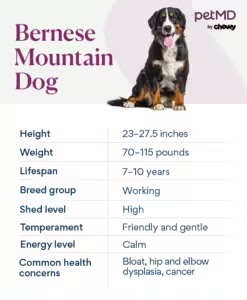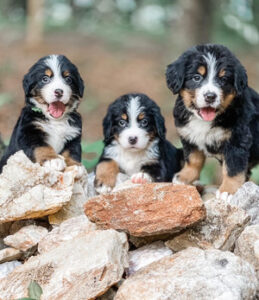
Bernese Mountain Dogs, with their distinctive tricolour coats and gentle temperament, are one of the most cherished breeds in the dog world. Known for their loyal nature and friendly disposition, these dogs make excellent family pets, particularly when raised with care and attention from a young age. In this article, we’ll dive deep into what makes Bernese Mountain Dog puppies so special, covering everything from their unique characteristics and temperament to tips for training, grooming, and general care.
Introduction to Bernese Mountain Dogs
Bernese Mountain Dogs, affectionately known as “Berners,” originally hail from the Swiss Alps, where they worked alongside farmers and herders. Their strength, loyalty, and intelligence made them ideal for pulling carts, herding cattle, and serving as steadfast companions. Berners are a large breed, often weighing between 70 to 115 pounds, and are instantly recognizable by their stunning tricolour coats featuring black, white, and rust markings.
For families considering adding a Bernese Mountain Dog puppy to their household, it’s essential to understand their needs, temperament, and how best to care for them.
Characteristics of Bernese Mountain Dog Puppies

Bernese Mountain Dog puppies are playful, loving, and naturally curious. As young puppies, they may seem small and soft, but they grow quickly into their adult size. Here are some key characteristics of Bernese Mountain Dog puppies:
- Size: Puppies are small at birth but experience rapid growth. By three months, they can weigh around 25 to 30 pounds, and by six months, they may reach half of their adult weight.
- Coat and Colors: Bernese puppies have a fluffy coat that grows into the characteristic thick, double-layered adult coat. The coat is usually a combination of black, white, and rust, with a distinctive “Swiss cross” marking on their chest.
- Temperament: Bernese puppies are known for being affectionate, loyal, and good-natured. They are generally very gentle, making them suitable for families with children.
Temperament and Personality
One of the most remarkable qualities of Bernese Mountain Dogs is their temperament. Known for their sweet and gentle nature, Bernese puppies are social animals who love being around people. They tend to bond closely with their families and are often particularly gentle with children. Here are some highlights of a typical Bernese Mountain Dog’s personality:
- Friendly and Social: Bernese puppies are rarely aggressive and are known for their friendliness. They are usually welcoming to visitors, though they may bark initially to alert their owners.
- Loyal and Protective: As they grow, Bernese Mountain Dogs form strong bonds with their family. They are protective without being overly aggressive, making them excellent watchdogs.
- Intelligent and Trainable: Berners are highly trainable, and they enjoy learning new commands. However, they are also sensitive, so they respond best to positive reinforcement rather than harsh corrections.
Training Tips for Bernese Mountain Dog Puppies

To raise a well-behaved Bernese Mountain Dog, training is crucial. Starting early and being consistent will help shape your puppy into a loyal and obedient adult dog. Here are some tips to consider:
- Start with Basic Commands: Begin with simple commands like “sit,” “stay,” “come,” and “down.” Using positive reinforcement, such as treats and praise, encourages good behavior and strengthens the bond between you and your puppy.
- Socialize Early: Bernese puppies are naturally friendly, but early socialization is crucial to ensuring they’re comfortable around other dogs, animals, and new environments. Introduce them to various sights, sounds, and people to build their confidence.
- Be Patient and Gentle: Berners are sensitive dogs, so avoid using harsh or aggressive training methods. Gentle, patient instruction works best, as they respond well to encouragement and rewards.
- Leash Training: Given their size, leash training is essential to prevent pulling as they grow larger. Start leash training early to make walks enjoyable and safe for both you and your dog.
Health Considerations for Bernese Mountain Dog Puppies

Bernese Mountain Dogs have a relatively short lifespan, typically around 6 to 8 years. However, with good care and attention to their health, they can enjoy a happy and fulfilling life. Here are some health considerations to keep in mind when raising a Bernese Mountain Dog puppy:
- Hip and Elbow Dysplasia: Large breeds like Berners are prone to joint issues such as hip and elbow dysplasia. Regular vet check-ups and controlled exercise are essential to monitor and prevent these conditions.
- Cancer: Sadly, Bernese Mountain Dogs have one of the highest incidences of cancer among dog breeds. Regular vet visits and being aware of any unusual lumps or changes in behavior can help in early detection and treatment.
- Bloat (Gastric Torsion): Like many large breeds, Berners are prone to bloat, a serious condition where the stomach twists. Feeding your dog smaller, more frequent meals and avoiding exercise right after eating can help reduce the risk.
- Regular Vet Visits: Routine check-ups, vaccinations, and health screenings are critical for keeping your puppy in top health.
Grooming and Coat Care
Bernese Mountain Dogs have a thick double coat that requires regular grooming to keep it clean and free of tangles. Grooming helps minimize shedding in addition to maintaining the health of their coat.
- Brushing: To keep their coat smooth and manageable, aim to brush your Bernese puppy at least twice a week. As they grow, more frequent brushing may be necessary, especially during shedding seasons.
- Bathing: Bernese Mountain Dogs do not require frequent baths. Every few months or when they get dirty is usually enough, as over-bathing can strip natural oils from their coat.
- Nail Trimming: Like all dogs, Bernese puppies need regular nail trims. Their nails can grow quickly, so be sure to trim them every few weeks to prevent cracking or discomfort.
- Ear Cleaning: Check and clean your puppy’s ears weekly to prevent ear infections, which can be common in floppy-eared breeds.
Feeding and Nutrition
Proper nutrition is crucial for Bernese Mountain Dog puppies to support their rapid growth and maintain overall health. They need a balanced diet with high-quality ingredients tailored to large-breed puppies.
- Choose Large-Breed Puppy Food: Bernese puppies grow quickly and need food formulated for large-breed puppies. This type of food contains the appropriate nutrients to support bone development and prevent excessive weight gain.
- Avoid Overfeeding: Obesity can strain a Bernese’s joints and lead to other health issues. Stick to recommended feeding amounts, and avoid giving too many treats.
- Hydration: Always ensure your Bernese puppy has access to fresh water, especially after playtime or outdoor activities.
Exercise and Activity Needs
While Bernese Mountain Dog puppies enjoy playtime, it’s essential to avoid strenuous exercise when they’re very young, as their bones and joints are still developing. Here’s how to manage their activity needs as they grow:
- Puppy Playtime: Gentle play and short walks are perfect for young puppies. Avoid long runs or jumps to protect their developing joints.
- Gradual Increase in Activity: As your puppy grows, gradually increase the duration and intensity of exercise. By the time they’re a year old, Berners enjoy daily walks and moderate hikes.
- Mental Stimulation: Bernese Mountain Dogs are intelligent and need mental stimulation in addition to physical activity. Puzzle toys, training games, and interactive play can help keep them engaged and happy.
Is a Bernese Mountain Dog Right for You?
Bernese Mountain Dogs are loving, loyal, and enjoy being part of family life. However, they do have specific needs that potential owners should consider:
- Space Requirements: Due to their large size, Bernese Mountain Dogs need ample space to move around. They’re well-suited for homes with yards where they can play.
- Time and Commitment: Berners thrive when they’re given plenty of attention and companionship. If you’re away for long periods, they may feel lonely or anxious.
- Willingness to Manage Health Needs: With their relatively short lifespan and predisposition to certain health issues, Bernese Mountain Dogs require committed owners who can provide them with regular vet care and attention.
The Pleasure of Bringing Up a Bernese Mountain Dog.

Raising a Bernese Mountain Dog puppy is a rewarding experience filled with love, joy, and companionship. Their affectionate nature, loyalty, and gentle demeanor make them excellent family pets, especially when given the right care and training from an early age. With the right preparation and a commitment to their well-being, your Bernese puppy will grow into a beloved member of the family, bringing joy and loyalty to your life for years to come.
Whether you’re drawn to their adorable, fluffy appearance as puppies or their loyal, dependable nature as adults, Bernese Mountain Dogs truly are one of the most endearing breeds.

